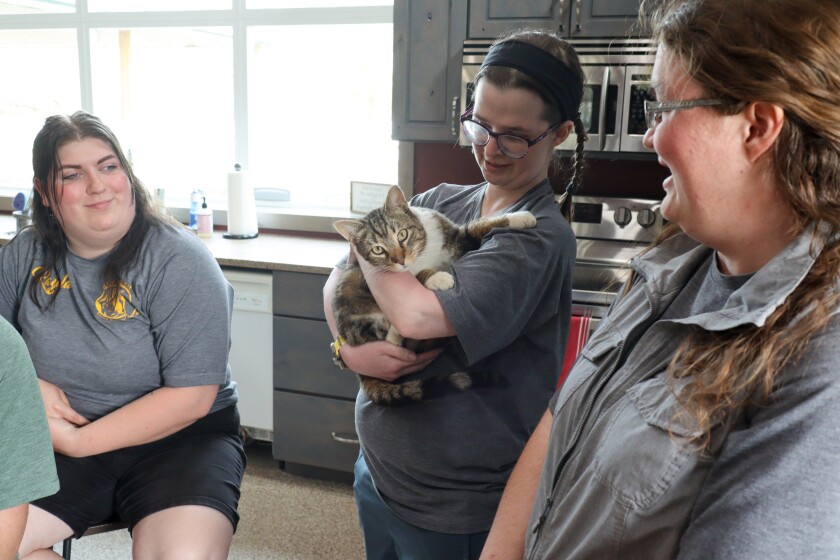GLYNDON, Minn. — If you are a dreamy and romantic type, you might describe That’s the Dream Farm as a storybook come to life, with tall trees, white fences, gem-green pastures, a herd of four fine-looking horses and Cricket, a stubby pony with a Napoleon complex.
But Dawn Robson, the horse lover who owns the farm with husband, Rob, knows a lot of hard work goes into making storybooks.
When she and her young team aren’t clearing brush, tending horses or mucking out stalls from this 10-acre spread northwest of Glyndon, they offer equine-assisted learning to people through Refresh, a nonprofit offshoot of the farm.
Through Refresh, they have worked with everyone from workplace teams and nonprofit organizations to refugee groups and men in recovery.
Their aim is to help people learn to work with horses as a way to heal their own traumas and relationship patterns. In the process, they typically find this work translates afterward into the real world — and the conflicts and relationship issues they’ve had in the past begin to melt away.
ADVERTISEMENT

It’s all based on a type of equine learning called Natural Lifemanship , which is as complex and hard to understand as it is effective and life-changing.
“It’s something we always struggle to describe or even show it,” says Christian Klonowski, who manages the farm.
Klonowski has first-hand experience benefiting from Natural Lifemanship. When he started working at the farm in 2020, he had childhood associations with horses as huge, dangerous and scary beasts. “I couldn’t even touch one,” he recalls.
Through the encouragement of Robson and her team, Klonowski says he was able to process what had happened before and separate it from his current and future interactions.
“From some of the first interactions, it was obvious to me that (the horses) could feel this and most of them wanted to comfort me from afar since I was not comfortable interacting with them physically,” he says.
Once Klonowski started learning and applying the principles of Natural Lifemanship, he says his progress with the horses “skyrocketed.”
He went from being afraid to be in the same room with them to feeling 100% comfortable working alongside them. “I am very thankful to have a program to learn from that has allowed me to build relationships with our horses and other farm animals but also to help strengthen my other personal relationships,” he says.
While the transformational power of Natural Lifemanship is sometimes described as magical, it is based on very real scientific principles, according to Tim Jobe, the New Mexico man who built the foundations of the philosophy 40 years ago when he started working on a Texas ranch for at-risk youth.
ADVERTISEMENT
“We help people and animals form relationships to overcome stress and trauma — and form new neural pathways,” Jobe has said in past interviews.
How ‘The Dream' became the reality
Growing up in Carrington, North Dakota, Robson loved spending time with the family horses.
After getting her nursing degree at Concordia, she and Ron, an aerospace engineer, moved to Fort Worth, Texas, so he could design fighter planes. They eventually wound up taking an unlikely career detour when they moved back to Fargo to become “employee No. 4 and No. 5” for their nephew Michael Chambers’ biotech startup, Aldevron.
Robson later returned to nursing but found it difficult to balance night shifts while homeschooling her daughter, Amanda, who is on the autism spectrum. The stress and long hours caused health problems and she eventually had to leave the profession.
In 2019, the family was able to purchase their dream farm. The old barn on the original property was rotting so they razed it and replaced it with several large metal buildings, including one large enough to house a regulation riding arena.

Amanda’s roommate, Annora Ruth, who is also on the spectrum, loved coming out to the farm with Amanda to see the animals. One day, Annora was trying to hold Teddy, Robson’s large and handsome paint horse, on his lead, but he was acting skittish.
Annora turned to him and said, “It’s OK, Teddy. You’ll be OK.” And then, in a flash of self-revelation, Annora lit up and announced, “Hey, that’s what my therapist always says to me!”
ADVERTISEMENT
In that moment, Robson saw the potential for incorporating horses into a healing journey for people impacted by trauma.
“The lightbulb went on for me and I started searching for a program that combined emotional learning and healing with horses,” she says.

After earning her certification in Natural Lifemanship, Robson says she was finally able to find the perfect way to combine all the interests and continuing education she had pursued over the years: from horses and nursing to life coaching certifications from John Maxwell Team and the American Association of Christian Counselors. She had long envisioned building a serene setting where people could learn, grow and heal. In the past, when she told people of her plans, she would end it all by saying, “Well, that’s the dream anyway.”
Now she not only saw that dream become reality, but she also found the perfect name for the farm where all those wonderful things could happen.
Better living through horseplay
Typically, horses are trained through power and control. The animal is dominated and forced until they are “broken” and learn to follow the leader.
As horses have historically been prey animals, they learn to do this to survive, Robson says. They live in a “fight or flight” state where they are hyper-vigilant of their surroundings and any potential dangers around them.
It’s one reason they are so finely tuned to the emotions and intents of the humans around them. Is that person angry? Will he hurt them? It’s literally how they’ve learned to stay alive, Robson says.
In this sense, the horse brain is a lot like that of the brain of a human who is locked in trauma, she says. A person may have been so damaged by an abusive relationship or past event that they, too, feel trapped in survival mode.
ADVERTISEMENT
And because many of those traumas come from past relationships, it often takes a healthier kind of relationship to “fix” that trauma, according to the tenets of Natural Lifemanship.

But it can’t be just any relationship, Jobe says. “One thing we believe is that a relationship has to be good for both parties or it’s not good for either one,” he said in an earlier interview.
The idea behind Natural Lifemanship is that the human approaches the horse and basically makes a request for the animal to cooperate. At the same time, the animal must know he has a right to refuse or ignore that request and won’t be hurt for doing so. This gives the animal freedom of choice and encourages him to use the thinking, neocortex part of the brain vs. simply sliding into “fight or flight” survival mode, Jobe says.
In response, the human won’t punish the animal, but will gently increase pressure, Robson explains. “We keep on pursuing the relationship so that, yes, you can say no, but then we say, ‘But why is it a no? Let’s think about it. Is there something I can do to help you?' We are still going to pursue that connection and relationship, which is good for everyone, including horses.”
As the horse and human work together, each learns how to regulate their own emotions and responses, which are sometimes helped along by the other through tools such as rhythm (walking in circles, brushing the horse for mutual bonding), or relationship (spending time with the human).
The very same principles can be used to help other humans regulate, whether that means rhythmic rocking, listening to soothing music or walking together, Robson says.
The power of this approach is that it seems to somehow change how Natural Lifemanship students interact in all human relationships afterward. By learning how to replace tactics such as power and control — which we use because we are fearful — with approaches like respect, cooperation and connection, we break down old trauma-based habits and experience better relationships, she says.
Robson says they are still working to get the word out there on the farm’s equine-assisted services and would love to add a licensed counselor who is interested in Natural Lifemanship certification.
ADVERTISEMENT
In the meantime, she and the team have experienced significant rewards by working with the Legacy Children’s Foundation, an organization for refugee children, and the New Life Center’s Genesis Recovery Program for men battling their way back from addiction and homelessness.
The serene surroundings and animals alone seem to be therapeutic. “You’ll see these big burly guys going head over heels with a 10-pound cat,” says Annora, still a faithful visitor to the farm.

One little girl from Legacy was terrified of all animals on the farm, as refugees are often chased by dogs when they are living in camps.
But through Natural Lifemanship principles like rhythm and relationship, the little girl not only grew to love the dogs and cats, but, the third visit, asked Robson if she could braid one of the horse’s tails.
She did — and was beaming with joy at being able to do so.
That, as they say, was the dream all along.
To learn more about That's The Dream and Refresh, go to www.thatsthedream.farm.
Next week: After falling off a horse and breaking her arm as a little girl, author Tammy Swift grew up to be wary of horses. See what happens after she participates in a few sessions of Natural Lifemanship.
ADVERTISEMENT














